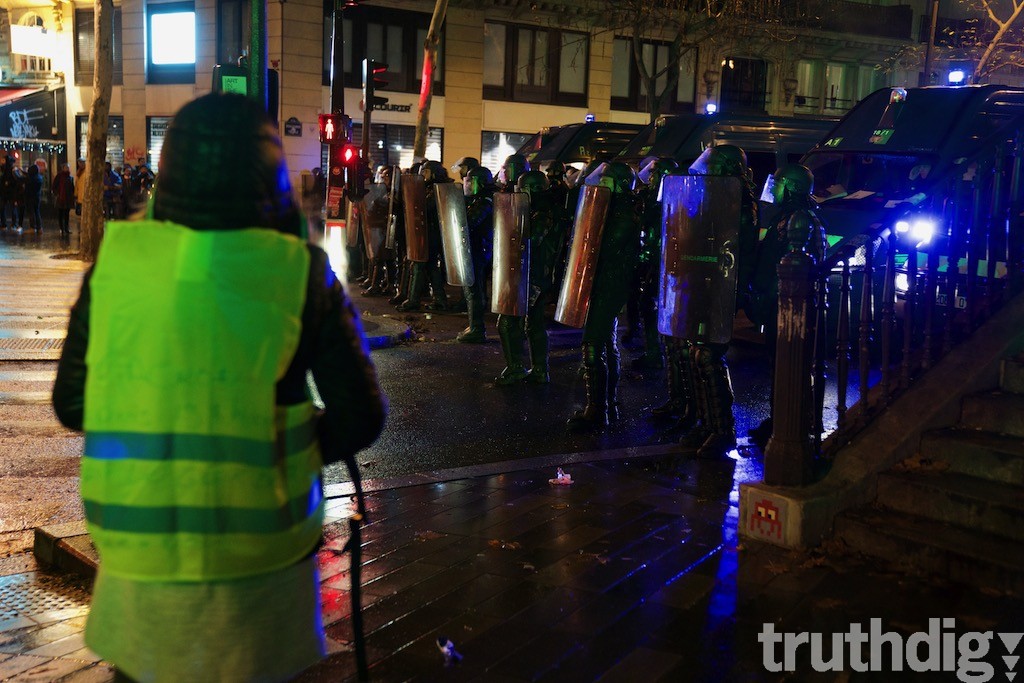French Working-Class Protesters Demand Higher Standard of Living
The “Gilets Jaunes” are angry about President Emmanuel Macron’s policies, which they say favor the wealthy. Police used tear gas on crowds demonstrating in Paris. (Donald Kaufman/Truthdig)
Police used tear gas on crowds demonstrating in Paris. (Donald Kaufman/Truthdig)
Nearly 1,000 people are in police custody and at least 71 have been injured after protests that turned violent in France on Saturday. The grassroots protesters, called Gilets Jaunes—“Yellow Vests”—have expressed frustration with the high cost of living in France and the pro-business policies of centrist President Emmanuel Macron, called by some “the president of the rich.”
Macron has proposed increasing taxes on diesel and gas, and although the government has since acquiesced and scrapped the proposal, many working-class people considered that demand a only starting point. The approximately 125,000 people wearing yellow vests who took to the streets Saturday in ongoing protests were joined by about 89,000 police officers, some of whom used tear gas on the crowds. Single mothers, factory workers, delivery workers, secretaries and other workers joined to protest tax cuts for the wealthy and a minimum wage that doesn’t cover basic expenses.
“The Gilets Jaunes that you see in the streets, they’re mainly middle-class, and they’re being bled dry financially,” said Jacques, a technical college teacher and Gilets Jaunes organizer. “The wealth gap is getting wider, and we’ve reached a point where there are the very rich and the very poor—and more and more people are slipping into poverty.”
“Macron’s first move in office was to slash the wealth tax for the mega-rich while cutting money from poor people’s housing benefits,” said Céline, a classroom assistant for children with special needs. “That is a serious injustice.”
Truthdig’s Donald Kaufman covered the protests in Paris:
Snapshots from Saturday’s Paris Protests
French authorities are seeking charges against the person who graffitied the Arc de Triomphe last weekend. At Jacobin, French writer Édouard Louis argued that focusing on such actions in the streets misses the point:
[A] large part of the media-political world wanted us to believe that violence is not the thousands of lives destroyed and reduced to misery by politics, but a few burnt-out cars. You must really never have experienced poverty, if you think that graffiti on a historic monument is worse than the impossibility of being able to take care of yourself, of living, of feeding yourself or your family.
“Don’t mix us up with the casseurs (smashers and looters); they are nothing to do with the Gilets Jaunes and we’re not here for that,” one member of the movement told The Guardian.
To understand the urgency of #GreenNewDeal, look to France. Neoliberal climate action passes on the costs to working people, offers them no better jobs or services + lets big polluters off the hook. People see it as a class war, because it is. https://t.co/xtuF35XXVP
— Naomi Klein (@NaomiAKlein) December 8, 2018
More than 1,700 French protesters were arrested as nearly 125,000 #GiletsJaunes demonstrators took to the streets for the fourth weekend running. pic.twitter.com/k8syFthh0k
— Al Jazeera English (@AJEnglish) December 9, 2018
“This movement must continue, for it embodies something right, urgent, and profoundly radical, because faces and voices that are usually reduced to invisibility are finally visible and audible,” Louis wrote.
Your support matters…Independent journalism is under threat and overshadowed by heavily funded mainstream media.
You can help level the playing field. Become a member.
Your tax-deductible contribution keeps us digging beneath the headlines to give you thought-provoking, investigative reporting and analysis that unearths what's really happening- without compromise.
Give today to support our courageous, independent journalists.






You need to be a supporter to comment.
There are currently no responses to this article.
Be the first to respond.